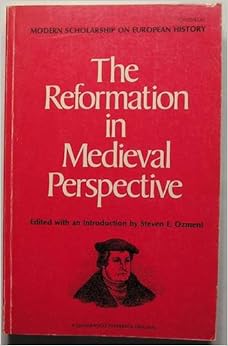 The Reformation Era 1500-1650 by Harold J. Grimm
The Reformation Era 1500-1650 by Harold J. GrimmCall Number: BR305.2 .G74 1965
Publication Date: 1965
The Reformation Era was, accordingly, one of upheaval in nearly every sphere of thought and action. The breakdown of medieval conceptions and institutions and the threat to the unity of western Christendom led thoughtful people to develop reform programs often in conflict with one another; far-reaching economic changes were accompanied by social maladjustments which frequently led to violence; the development of compact states by ambitious territorial rulers was opposed by various political elements which occasionally used religious dissatisfaction to further their political ends; and religious changes themselves were seldom made without disturbances and even bloodshed. Nevertheless, the chief Protestant reformers refused to become involved in the many non-religious schemes which accompanied every religious change. By reviving the evangelical character of the early church and applying it to the circumstances of their own day, they infused Christianity with dynamic qualities which made it a continuing influence in western civilization. By reviving the best features of medieval Christianity, the Catholic reformers promoted piety and learning, thereby restoring a good measure of the glory and prestige of Catholicism. As the Reformation Era neared its close, however, the religious movements, both Protestant and Catholic, lost much of their dynamic character, while the aggressive territorial rulers assumed the initiative in directing the thoughts and actions of the people. By the middle of the seventeenth century, most of the European states had become secularized, and religion, like other vital elements of society, was being used to further the interests of the state. The victory of the secularized territorial state was accompanied by the gradual secularization of European society and culture as a whole. Religious standards, by which economics, social, and political behavior had previously been measured, were to a large degree replaced by secular standards, ascertained primarily by the observation of man's social behavior. The relegation of religious authorities and faith to the background in European life marks the end of the Reformation Era and the beginning of the Era of the Enlightenment.

 The Reformation Era 1500-1650 by
The Reformation Era 1500-1650 by  Forerunners of the Reformation The Shape of Late Medieval Thought by
Forerunners of the Reformation The Shape of Late Medieval Thought by  The Reformation in Medieval Perspective by
The Reformation in Medieval Perspective by